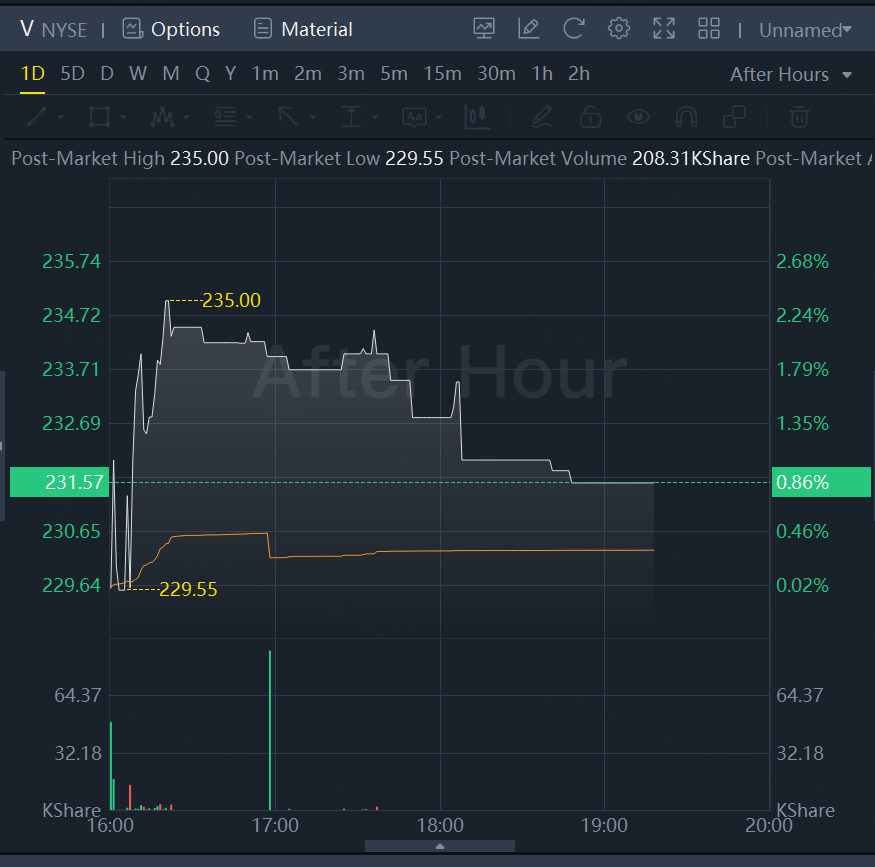Shares of Visa Inc. were headed 1% higher in after-hours trading Tuesday after the payment-technology giant easily topped profit expectations for its latest quarter and called out a continued recovery in travel spending.
The company logged fiscal second-quarter net income of $4.26 billion, or $2.03 a share, compared with $3.65 billion or $1.70 a share, in the year-earlier quarter. On an adjusted basis, Visa (V) earned $2.09 a share, up from $1.79 a share a year before, while analysts tracked by FactSet were modeling $1.99 a share.
Revenue increased to $7.99 billion from $7.19 billion a year prior, whereas analysts were looking for $7.80 billion.
"Visa today has three robust growth engines: consumer payments, new flows and value-added services," Chief Financial Officer Vasant Prabhu said on the earnings call. "Our results in the second quarter attest that growth remains healthy across all three businesses."
Visa's payment volume rose 10% in the March quarter, while total cross-border volume jumped 24%. Excluding intra-Europe transactions, cross-border volume was up 32%.
"The cross-border travel recovery continues at the pace we expected," Prabhu said, though Visa sees potential for a further rebound ahead.
"Travel from Mainland China has mostly benefited other parts of Asia so far, but early bookings suggest strong interest in Europe as the summer approaches," he continued, according to a transcript from AlphaSense/Sentieo.
The company saw 12% growth in processed transactions.
"While there is macroeconomic uncertainty, I feel confident in Visa's ability to manage through changing environments," Chief Executive Ryan McInerney said in Visa's earnings release.
Prabhu noted on the earnings call that while ticket prices were up about 1% in the first quarter, they've registered small declines more recently, owing to factors like declining fuel prices relative to year-earlier levels and discounting at some retailers.
Consumers are buying "the same amount of fuel" but prices are lower, Prabhu said in an interview. Additionally, Visa is seeing "some impact from pricing moderating in the travel sector" as "travel prices reached a high level last year" and are "still going up but not at rate they were."
There's "not much change in behavior," he added.
Client incentives, which are a contra-revenue item, came in at $2.9 billion, representing 26.7% of gross revenues. These were "below expectations due to some deal timing, client performance and other items," Prabhu said on the earnings call.
The company expects client incentives to be larger in the second half of the year than in the first.
Visa is benefiting from increasing card penetration in once-stubborn use cases such as small-ticket items. The company has been making a big push to get transit hubs equipped with contactless payment options, for example.
Outside the U.S., 74% of all face-to-face transactions happen through tap payments. The U.S. is slower along in the evolution but has reached 34% penetration, according to Visa's stats.
Prabhu noted that it's becoming ever-easier for businesses to accept card payments.
Years ago, "the only way" a small business could be equipped to take card payments was to "set up a landline and get an expensive device," he said, but now there are various options that let people accept card payments with just their phones.
Visa's stock has advanced more than 10% to start 2023, as the Dow Jones Industrial Average has gained about 1%.


